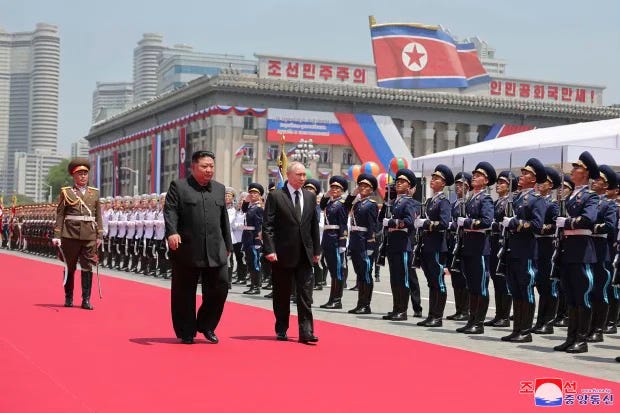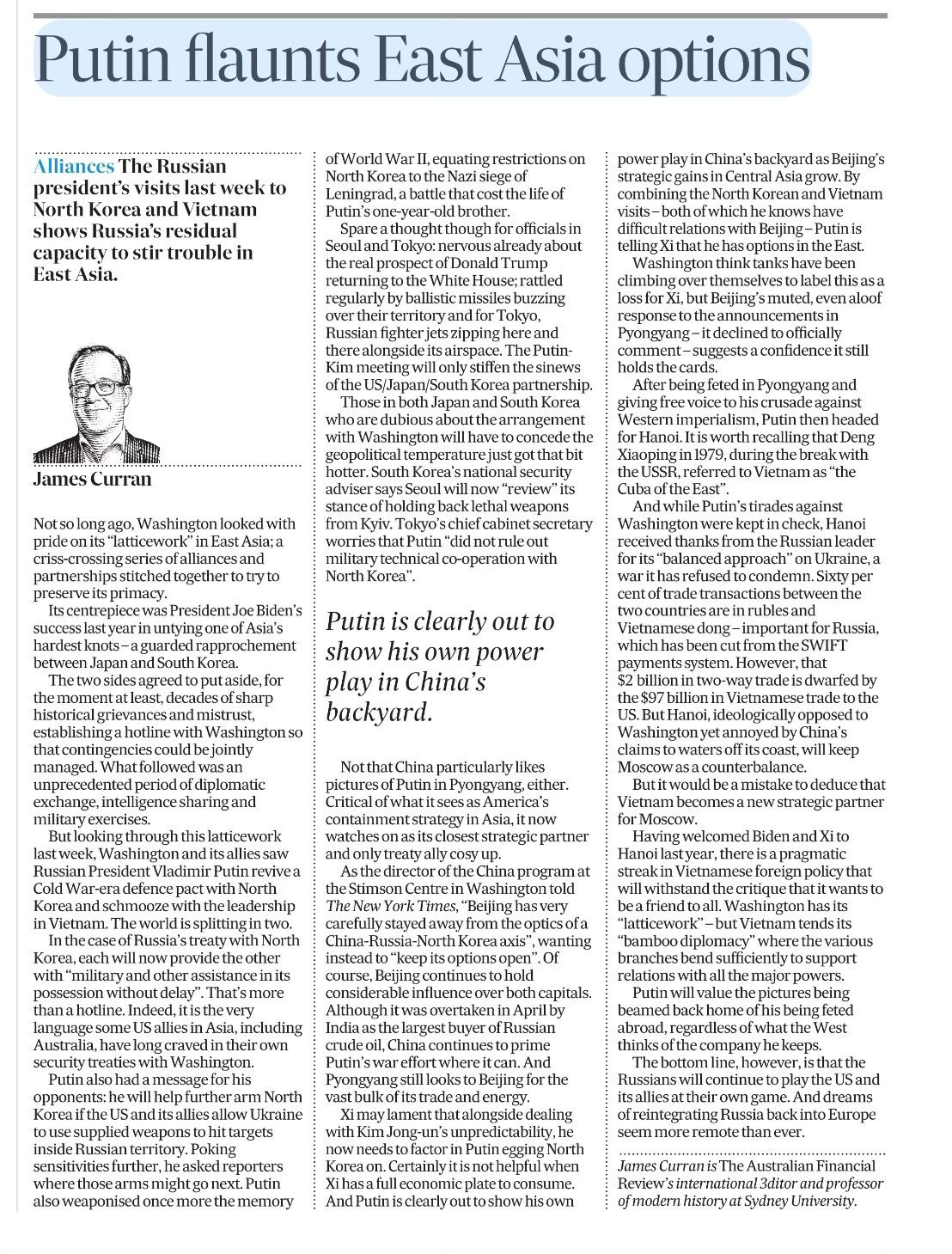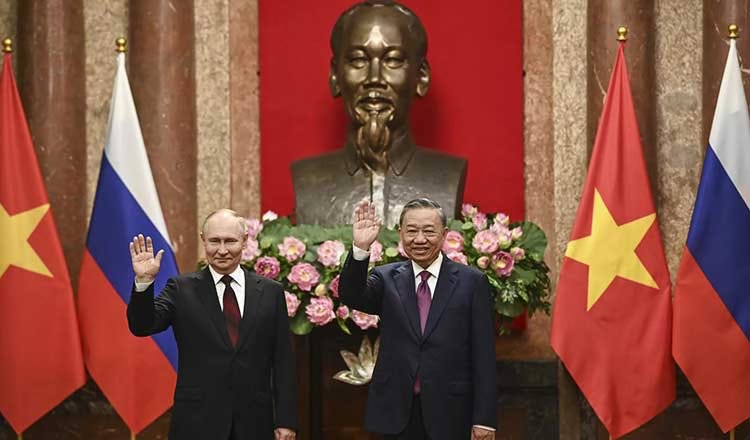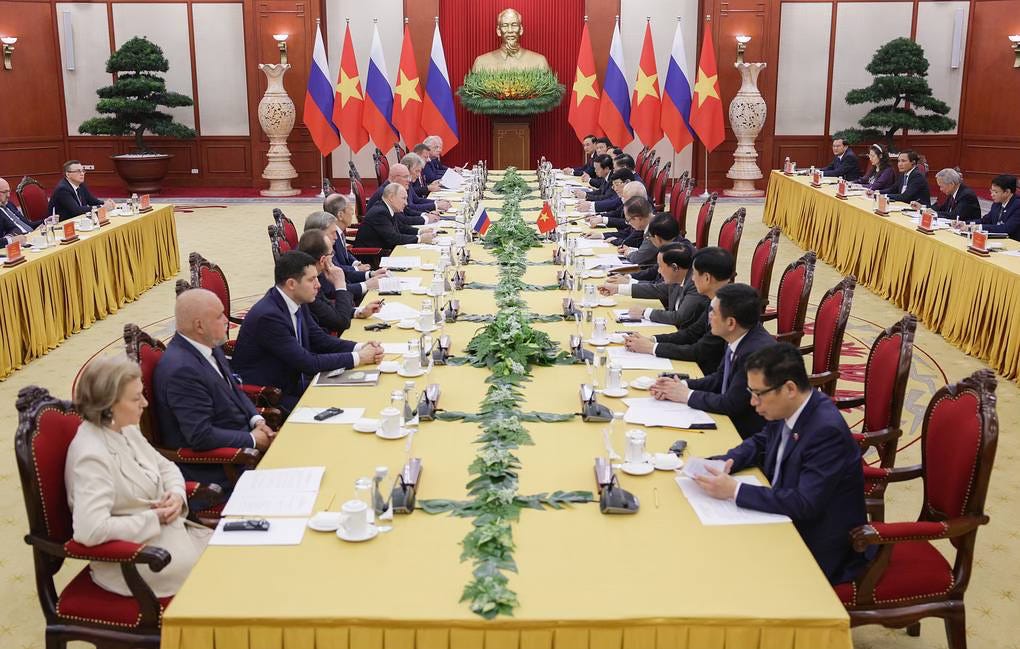Russian Revival
Putin has options in East Asia, Putin arrives in Vietnam for two-nation Asia tour, Russia-Vietnam joint statement: key provisions, Why Russia's economy continues to thrive amidst sanctions?
Putin to Xi: I have options in East Asia
By James Curran (AFR)
Not so long ago, Washington looked with pride on its “latticework” in East Asia; a criss-crossing series of alliances and partnerships stitched together to try to preserve its primacy.
Its centrepiece was President Joe Biden’s success last year in untying one of Asia’s hardest knots – a guarded rapprochement between Japan and South Korea.
Read full article below.
Russia’s Putin arrives in Vietnam for final stop on two-nation Asia tour
Putin hails Vietnam for backing ‘a pragmatic way to solve the crisis’ in Ukraine in an op-ed released in advance of his visit.
Putin’s aircraft touched down in Hanoi early on Thursday, the agencies reported. Vietnam is the final stop on his two-nation tour of Asia.
Ahead of his arrival, Putin praised Vietnam for its “balanced” stance on the Ukraine war and listed progress on payments, energy and trade in an opinion piece published in the newspaper of Vietnam’s Communist Party.
Putin applauded the Southeast Asian Communist-governed country for supporting “a pragmatic way to solve the crisis” in Ukraine, in comments published in the Nhan Dan newspaper on Wednesday.
Vietnam, which officially pursues a neutral foreign policy in its relations with major world powers, has not condemned Russia’s attack on Ukraine.
Putin plans to meet Vietnamese leaders on Thursday, on the heels of a trip to North Korea where leader Kim Jong Un promised “full support and solidarity” for Russia’s war in Ukraine.
The two leaders signed a deal that included a mutual defence pledge, one of Russia’s most significant moves in Asia for years that Kim said amounted to an “alliance”.
Al Jazeera’s Yulia Shapovalova, reporting from Moscow, said local media have been portraying Putin’s visit to the region as one that is “resonating with the world”.
“They say the visits … have attracted close attention from the United States and the West as they could potentially affect the regional, geopolitical landscape,” Shapovalova said.
In the opinion piece, Putin, who is making his first visit to Vietnam since 2017 when he attended an Asia-Pacific Economic Cooperation (APEC) summit, said Russia and Vietnam also shared “similar assessments of the situation in the Asia-Pacific region”.
Vietnam’s position on the South China Sea differs from that of China, which claims the strategic waterway almost entirely as its own, including gas and oil fields in Vietnam’s Exclusive Economic Zone where Russian companies extract oil and gas.
‘Strategic importance’
Putin said energy was “an area of strategic importance in bilateral cooperation” and cited Russia-Vietnam joint ventures on fossil fuels in the South China Sea and in northern Russia.
Gazprom also operates gas fields in Vietnam, he noted. Russian energy firm Novatek “plans to launch liquefied natural gas (LNG) projects in Vietnam”, Putin said without elaborating.
He also cited an initiative “to establish a Centre for nuclear science and technology in Vietnam” with the support of Rosatom, Russia’s state-owned nuclear energy giant.
About a decade ago, Vietnam suspended a plan to develop a nuclear power plant and it is unclear whether it intends to reconsider that position. South Korea and Canada are among countries that have proposed nuclear energy options to Vietnam, according to people familiar with the matter.
Putin also praised progress on finance and trade.
Settling payments between the two countries was made complex by Western sanctions on Russian banks, and the issue has long been a priority in bilateral meetings, officials have said.
Vietnam has historically been a big importer of Russian weapons.
Putin said transactions in roubles and Vietnamese dong accounted for 60 percent of bilateral trade payments in the first quarter of this year, up from more than 40 percent last year.
“Vietnam-Russia Joint Venture Bank plays an important role in ensuring reliable financial transactions,” Putin wrote, referring to a Hanoi-based lender set up in 2006.
He also noted that bilateral trade was increasing.
However, Vietnam’s trade with Russia remains limited and the United States and China are Hanoi’s main trading partners.
Read more here.
Russia-Vietnam joint statement following Putin’s visit: key provisions
Russia and Vietnam "consistently strengthen the comprehensive strategic partnership in the spirit of friendship and mutual assistance amid the tough international situation"
TASS has summarised the main provisions of the document.
MOSCOW, June 20. /TASS/. Russia and Vietnam have issued a joint statement following President Vladimir Putin’s visit to Hanoi, in which the sides outlined plans for further cooperation and interaction in the international arena.
Putin invited the Vietnamese authorities to visit Russia at any convenient time, and the invitation was accepted.
Support for Putin’s foreign policy
Vietnam welcomes Vladimir Putin's re-election as Russian president in spring 2024 and believes that his re-election speaks volumes about how the Russian people feel about the direction the country is headed.
This support is due, among other things, to the foreign policy course, "an important direction of which is the development of cooperation with Vietnam."
Strengthening cooperation
Russia and Vietnam "consistently strengthen the comprehensive strategic partnership in the spirit of friendship and mutual assistance amid the tough international situation." Moscow and Hanoi "pay great attention to direct inter-regional ties, exchanges through non-governmental and party organizations, advocate making more efficient the existing formats and mechanisms of cooperation and, if necessary, creating new ones."
The sides agreed to step up economic cooperation, so they will create a high-level working group on priority investment projects.
Russia promised to speed up the construction of the Center of Nuclear Science and Technology. In addition, the sides advocated stepping up cooperation in tourism, "including by increasing the number of direct scheduled and charter flights between the two countries and simplifying conditions for mutual travel of citizens."
Fight with terrorism
Moscow and Hanoi support the development of an international convention to combat biological and chemical terrorism. Vietnam also condemned the terrorist attack on the Moscow Region’s Crocus City Hall in March 2024 and expressed solidarity with Russia in the fight against terrorists and extremists.
Asia-Pacific region security architecture
Interaction in the defense and security spheres "is of special importance in Russia-Vietnam relations. At the same time, "it is not directed against third countries and is characterized by a high level of mutual trust and is implemented in strict compliance with the principles and norms of the international legal system."
The goal of this partnership is "ensuring peace, stability and sustainable development" in the Asia-Pacific region and the world as a whole. Moscow and Hanoi support ensuring equal and indivisible security on the basis of non-aligned principles in the Asia-Pacific region.
Promoting multipolar world order
Russia and Vietnam will contribute to establishing a just multipolar world order based on the UN Charter.
The sides emphasize that "international obligations in connection with the immunity of the heads of state and their property must be strictly observed."
Information
Russia and Vietnam note common approaches to ensuring information security and agree to deepen cooperation in this sphere.
The sides will develop the international legal basis in this sphere and help each other in combating crimes committed with the help of information technologies. The sides support UN efforts to develop an international convention on combating cybercrime.
Space arms race
The sides voiced concern about the "threat of an arms race in outer space." Russia and Vietnam favor negotiating a treaty to prevent the placement of weapons in space.
ASEAN's role
Russia and Vietnam support strengthening the central role of the Association of Southeast Asian Nations (ASEAN) in the system of interstate relations in the Asia-Pacific region. Also, Moscow and Hanoi will promote increased cooperation between ASEAN, the Eurasian Economic Union (EAEU) and the Shanghai Cooperation Organization (SCO).
Ukrainian crisis
Russia highly appreciates Vietnam's balanced and objective position on the Ukrainian crisis. Moscow welcomes Vietnam's readiness to join international efforts to find ways to "peacefully and reliably resolve the conflict."
Middle East conflict
Russia and Vietnam are in favor of strengthening stability in the Middle East and are against interference in the region's internal affairs. The countries support the establishment of an independent Palestinian state with East Jerusalem as its capital.
Interaction in BRICS
Moscow will continue to work to strengthen ties "between BRICS members and developing countries, including Vietnam."
Read more here.
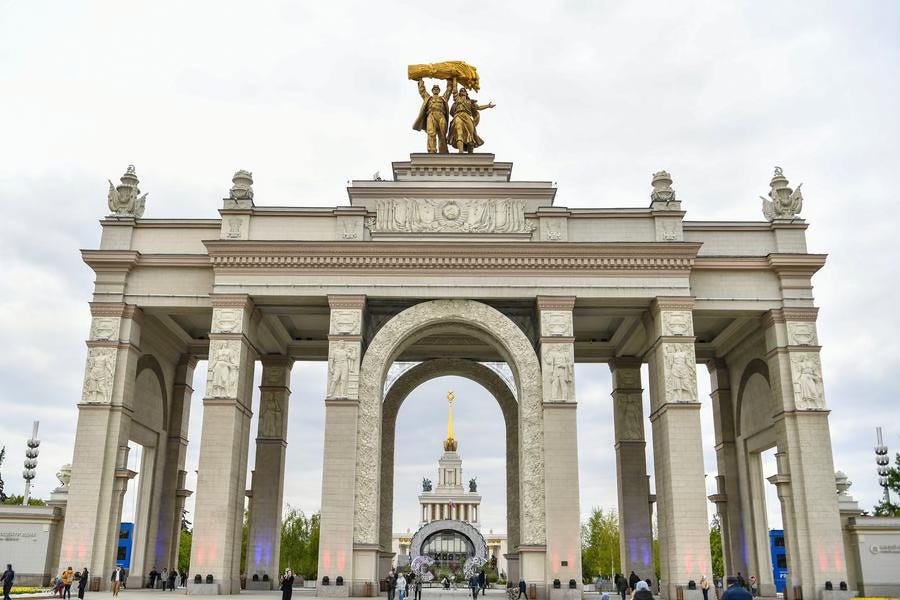
Why Russia's economy continues to thrive amidst sanctions?
Source: Xinhua
ST. PETERSBURG, May 17 (Xinhua) -- The International Monetary Fund said in April that Russia's economy is expected to grow 3.2 percent in 2024, faster than all advanced economies this year.
Despite the unprecedented sanctions imposed by Western countries, the Russian economy has not only maintained stable growth but also outpaced the global average growth rate.
What has enabled Russia's economy to withstand the pressure of sanctions and continue to grow?
VITAL ECONOMIC LIFELINE
Western countries have repeatedly extended the sanctions on Russia since the start of the Russia-Ukraine conflict, expanding embargoes on Russian goods and technological blockades, and forcing hundreds of large companies to exit the Russian market in an attempt to sever its international supply chains.
However, they have failed to fundamentally undermine Russia's vital economic lifeline -- its energy sector.
While the EU has banned imports of Russian coal and seaborne crude oil, the European Commission isn't proposing an outright ban on imports of Russian liquefied natural gas, which countries including Belgium, France and Spain still purchase in large quantities, as Politico reported.
The United States is also cautious about halting Russian oil supplies because it could lead to a sharp increase in oil prices, resulting in significant disruptions in the international energy market and potentially increasing Russia's oil export revenues.
The Russian economy has demonstrated a significant degree of adaptability to these Western sanctions and analysts believe that the U.S. government has almost exhausted its options for sanctions against Russia.
Russia's GDP achieved a 3.6 percent growth in 2023, significantly higher than forecast. Additionally, Russia's average annual unemployment rate stood at 3.2 percent as of the end of 2023, the lowest since 1992.
Russia can become the fourth-largest economy in the world, provided it maintains sustainable growth of at least 2 percent per year with a gradual acceleration to 3 percent, said Andrei Belousov, Russia's new defense minister and former first deputy prime minister.
As a major global producer of oil and gas resources, Russia heavily relies on energy exports for its fiscal revenue. The worsening geopolitical situation and the sharp increase in sanctions have compelled Russia to adjust its economic structure, aiming to boost the contribution of non-energy sectors to its GDP.
Since 2015, Russia has implemented an import substitution strategy. Initially focused on agro-industrial complexes, this strategy later expanded to areas such as information technology and mechanical engineering.
The sanctions imposed by the West on Russia since 2022 have prompted Russia to expand its countermeasures, said Mikhail Kuzyk, deputy director of the Centre for Industrial Policy Studies of the HSE University in Moscow.
Today, Russian domestic manufacturers have effectively replaced many foreign suppliers that have left the Russian market, especially in sectors like the food industry, heavy machinery and shipbuilding.
Last week, Russian Prime Minister Mikhail Mishustin announced plans to increase the volume of non-resource, non-energy exports by two-thirds.
"The share of local high-tech goods and services created based on our own developments will increase 1.5 times in six years," he was quoted as saying by Tass news agency.
To counter Western isolation and containment, Russia is also fostering economic and trade cooperation with regional organizations such as BRICS and the Shanghai Cooperation Organization.
"It seems that we are being strangled and pressured from every side, but still, we are the largest economy in Europe," Russian President Vladimir Putin said at a meeting with entrepreneurs, according to TASS.
RUSSIA'S SWIFT ALTERNATIVE
Among the sanctions imposed on Russia by the West, financial sanctions have had the most profound impact on the Russian economy.
Notably, the freezing of foreign exchange reserves and the expulsion of Russia from the Society for Worldwide Interbank Financial (SWIFT) -- a global provider of financial messaging services -- have not only caused the ruble to fluctuate but also created significant obstacles for Russia in conducting international trade and financial activities.
To address the challenging issue of cross-border payments, Russia has begun attracting more countries to join the System for Transfer of Financial Messages (SPFS) -- Russia's SWIFT alternative -- and promoting the use of local currencies in transactions with multiple countries.
According to a report by the Central Bank of Russia, the share of operations in rubles in export revenue in March increased to 43.9 percent, and in import calculations, it rose to 40.8 percent.
The growing share of the ruble in Russia's foreign trade settlements indicates increased confidence among foreign trading partners in the currency. Recently, the dollar exchange rate was at about 91 rubles, which is deemed normal by the government.
Read more here.



